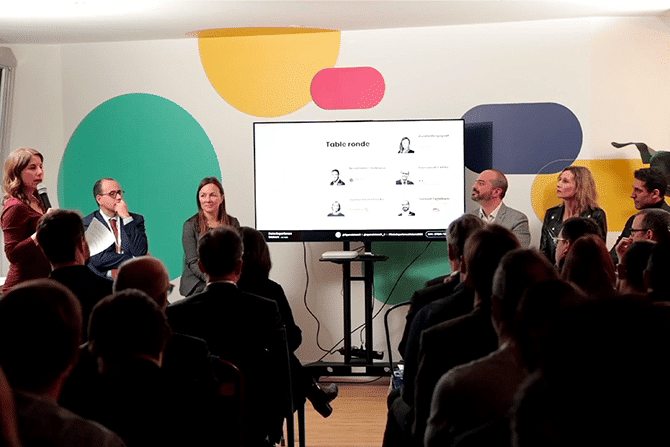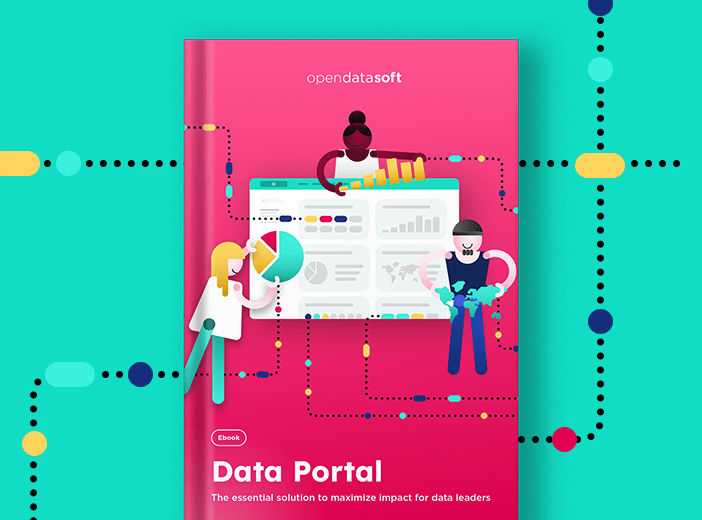Learning from data pioneers – best practice on the journey to data democratization
Companies and public sector bodies are all at different stages of their data sharing journey. How can they learn from each other and apply the lessons to accelerate data democratization? To help, our new blog shares best practices from 5 data pioneers.

Organizations increasingly understand the benefits that democratizing their data brings, internally and externally. However, turning their plans into action is more complex and challenging. To learn about the most common obstacles – and how to overcome them – Opendatasoft brought together five data pioneers to share their experiences and best practice.
Introducing our data pioneers
Demonstrating the importance of data democratization to all sectors, Opendatasoft’s roundtable debate brought together data leaders from the healthcare, transport/property, industrial, banking and public sectors. Our contributors were:
- Vanina Laurent-Ledru, Director General, Foundation S, Sanofi
- Samuel Tajtelbom, Real Estate Director, ICF HABITAT, SNCF
- Aurélie Bergugnat, Group Chief Data Officer, Schneider Electric
- Nouamane Cherkaoui, Chief Transformation Officer, BPCE SI
- Emmanuel Cortes, Program Director, Legal Department, DILA
What is the difference between being data-driven and data-centric?
Nouamane Cherkaoui explained: “Today, we are seeing a major evolution of both society and data. Previously, data was localized in processes. We have evolved towards data in applications which is leading to structural change in society.
For me, a data-centric organization is an organization that has a vision of data from which its entire business strategy stems. For example, Amazon has put its recommendation engine at the heart of its business model from day one. Being data-centric is the Holy Grail!
Being data-driven is when all decisions are made based on data, without the need for an expert to get involved. Anyone can use the data, whatever their role or skills. So to summarize, being data-centric is when the vision of data generates and defines strategy and innovation; being data-driven is when decisions are made, based on data. However, very few organizations reach these stages. Instead, what we see are siloed organizations in which information, i.e. data, does not circulate and people struggle to “liberate” data access and sharing beyond siloed organizational structures.”
Can only digital native companies successfully embrace data?
Absolutely not, said Aurélie Bergugnat. “In the case of Schneider Electric, we’ve been around for 150 years and so we’ve already had to reinvent ourselves a number of times. And so we are quite confident that we can transform through data. To do this we must build bridges between different groups to create a community. It can’t be about the cool, digital, data people and the rest.
At Schneider Electric, we are oriented towards “performance” whether operational, commercial, or financial. In my role I work with experts in different departments and explain to them that to drive performance I need them to structure their data. That gives us a common starting point and common language – they want to show that they are doing a good job, and we will help them do that, but they need to help us structure the data.
So I’ve been Schneider Electric’s Data Officer for three and a half years and the role is very recent. Building it from scratch in such a big organization is not simple, but is very rewarding. So the way we did it, we said to ourselves: as good manufacturers, data, in the end, is like a product that we build in a factory. Standardization is essential. To consume data, it must first be created. To create it and to be sure that is usable throughout the company and for all business models, it must be standardized by adopting common classifications. Then, once it is standardized, it is ingested. This is where technology comes in: it allows us to integrate data and consume it. To ensure the proper functioning of these processes, we have defined certain transversal working rules. My colleagues manage their business priorities, and we work together to structure the data. We are now well structured and we have all the necessary resources to be data-centric.”
Emmanuel Cortes shared a public sector view. “At DILA our mission is to provide a standard, single point of entry to government information. Historically, that meant we were a printing company, creating our official journal that went out every day at 7am. This evolved to Minitel, the internet, and now there is data and APIs. To transform ourselves, we have invested heavily in digital technology over the past fifteen years, especially in getting value from our data. While the tools are necessary, we realized it is more about the data and the right skills. So we are starting to recruit people who are dedicated to data, working for the long-term around quality and standards. It’s true this means a lot of change – but that’s what’s exciting.”
How do you ensure data is consumed by the right people?
Vanina Laurent-Ledru outlined how Foundation S is sharing data to meet its aims. “The foundation’s mission is to help vulnerable populations grow up healthier. One of our key objectives is to do everything possible to ensure that 60% of children can survive cancer by 2030. Data is an essential lever in this fight because it allows us to create virtuous ecosystems to connect health professionals and parents. This is essential for increasing child survival rates.
We have chosen to work with Opendatasoft to make data available not only to the public, but also to all health professionals. This data is from the programs we’ve carried out for ten years, around access to diagnosis, access to care and training of health personnel.
Vanina Laurent-Ledru outlined the central importance of transparency and building data-driven ecosystems. “We have heard a lot about data “at the service of meaning”. I put it at the service of impact. The real challenge for tomorrow’s philanthropy is how to measure impact and to gain this impact for your dollars you need to work together with other organizations. We need to work with data from ministries of health in the countries in which we are present, and we need to work with scientific organizations. In terms of our platform on childhood cancer, the idea is that doctors take ownership of it and that, in fact, they can contact the parents and the patients, themselves. Transparent ecosystems are essential to advancing the key causes we are working on.”
How do you ensure data consistency at a global level?
Schneider Electric is a global group, with multiple business units. Aurélie Bergugnat explained how the company is managing this complexity.
“The starting point for ensuring global data consistency is to define common baselines. The size of the company has quadrupled in fifteen years, and from an industrial heritage we have evolved to offer a wide variety of services and software. Setting up consistent data management between very different activities – industry, services, software – is an extremely complex task. We have therefore based ourselves on common repositories so that the systems set up from Paris transform all the Group’s geographic operations too.
We use a hybrid model. So we have a central data office that I manage with my team. We take care of the overall data strategy of the company, the definition of the model, and ways of working. And then, we leave the local implementation of these common repositories and common languages to individual businesses. This combines a strong top-down corporate push and a local bottom-up approach.”
How do you make data accessible to the business?
For Samuel Tajtelbom it is about focusing on organizational values, “At ICF Habitat we are built on several key values: creating connections, sharing to progress and working for quality. We are a subsidiary of a public service and we provide low rent housing. This notion of usefulness is therefore very strongly anchored in our DNA. Our architecture and governance around data have been set up in alignment with these principles. Each dataset has a meaning, a use, which has been previously thought out collectively. We do not want to “make data for data’s sake”, but we want it to have a strong use. We therefore systematically identified high value-added data sources in order to create uses and take action. For example, we recently completed our strategic plan by using internal and external data to create algorithms and improve our decision-making. We are thus moving from the world of opinion to a more enlightened and factual world.”
How do you successfully exploit data?
Data sharing comes into its own during times of crisis, but quality is vital according to Emmanuel Cortes, “Data is at the heart of our activities at different levels, both to improve our efficiency and to communicate better. Regarding communication, data allowed us to provide a high level of information during the COVID pandemic, for example. We had to enable data democratization, but also guarantee its authenticity and ensure that all public safety and health services were able to access and apply it.
Overall the issue of data quality quickly became apparent when we put increasing demands on our data. For example, when we digitized our archives from 1901, we came up against problems as some department numbers have changed geographical area in 60 years. It was therefore necessary to carry out a lot of work on quality, which also influenced the recruitments and skills we brought on board. We have also invested in a standards center and are involved in a number of international standards to help with wider sharing and usage creation.”
How do you encourage successful data democratization?
Panelists agreed that creating data-driven organizations required major change across a number of areas.
Nouamane Cherkaoui pointed to the need to take a holistic view. “Silos within organizations impact data sharing, requiring transformation, which spans several axes. It’s talent, it’s data, it’s tech, it’s the environment. We need to have a 360 degree vision to cover this, backed by a medium-long-term investment that can drive a radical change in practices and culture. Don’t just do tech for tech’s sake. When you invest in a technology, there has to be a use. If you start by investing and then look for uses, it is a guaranteed failure. Also, businesses that do not know how to use data have not been supported so that they can benefit from it. When we give people data now, they are not used to it, so this has to change. Finally, remember that data is perishable, and over time is no longer useful. These are all important factors that must be taken into consideration from the beginning when driving data transformation.
Aurélie Bergugnat agreed. “There needs to be a minimum of investment to ensure data and organizations are structured in a certain way. The future challenge of data is not necessarily sharing because we already have a lot of capabilities on the market overall. I think the short-term data issue is trust, and having confidence in the sharing of data. We want our customers to have confidence in how we use our data, and that we are working as trusted partners.”
To access the full recording of the roundtable debate, click here : Data Experience Makers.



